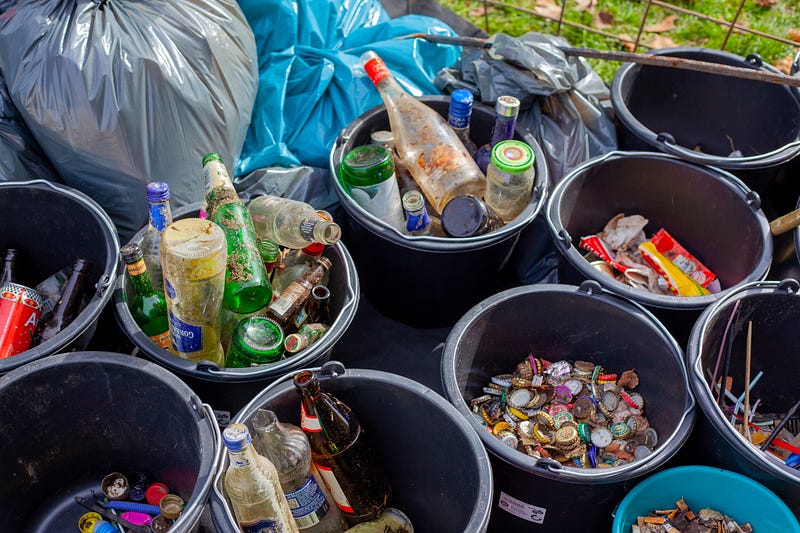Empowering Environmental Change: From Awareness to Action
Written on
Chapter 1: Rethinking Our Approach to Sustainability
In recent times, discussions surrounding environmental conservation have become somewhat stagnant and unproductive. I must admit, I don't ponder this topic as often as I should, and I’m eager to expand my knowledge on it moving forward.
So, where should we begin? What small actions can individuals take to contribute positively to our planet? I recently came across a young YouTuber who claimed she is “constantly seeking ways to lower her carbon footprint,” and it made me cringe a bit. This statement coincided with a promotional segment for a product marketed as sustainable, which seemed to prioritize profit over genuine eco-friendliness.
If she genuinely aims to reduce her carbon footprint, that's commendable. Perhaps she has made strides in that direction—I'm not here to criticize her personally. However, coming from Los Angeles, I’ve heard this phrase echoed often by those who, despite their claims, frequently use styrofoam containers while feeling virtuous about owning a single hemp garment labeled “sustainable.”
Have you noticed a significant gap in most dialogues about sustainability and carbon footprints? It’s education. We need to abandon these lofty and exclusive terms and instead communicate in a way that is truly understandable without requiring extensive research.
Logically, everyone should want to minimize their carbon footprint, yet can most of us articulate a coherent two-minute explanation of what that involves without merely repeating vague ideas about climate change and composting? Likely not, because many of us lack fundamental knowledge. We have recycling bins, but we hardly know what belongs in them.
While I recognize the benefits of solar panels, I haven’t delved into them much; as a renter, they seem irrelevant to my current situation. Until I own a home, discussions about solar power feel as distant as adult conversations about health issues.
As for composting, it's technically open to anyone, but it requires significant effort. This is a crucial aspect of our conversation. Let’s be honest—many people simply won’t compost. Even if they attempt it, it may not fit into their lifestyle sustainably. If an action isn’t feasible for someone, it won’t yield any real impact.
Want to encourage people to try composting? Great! Make it approachable. Discuss the benefits and clarify the process, being realistic about who might find it manageable and who might not. Avoid shaming those who choose not to participate and suggest alternative actions they can take.
Let’s move away from the elitism: “Do you even compost, bro?”
I appreciate the idea of “Meatless Mondays”—reducing meat consumption is an admirable goal, especially for those unwilling to eliminate it completely. While I might not want to commit to a specific day, it’s a simple yet impactful goal that can be made more appealing.
What if we all aimed to eat slightly less meat? Imagine if those who still want to enjoy their burgers could manage to go meat-free for just two days a week. What would the collective impact be? It would be beneficial for knowledgeable individuals to share that information more freely.
What about those who decide to try this out? Acknowledging their efforts doesn’t require a grand celebration; even a small gesture goes a long way. Picture a vegan restaurant offering discounts on Meatless Mondays to inspire and remind patrons of their commitment, or supermarkets promoting similar initiatives. This approach could generate significant benefits while being underutilized.
While many are motivated to lower their carbon footprint by adopting a vegan diet, if that’s not feasible for you, committing to one meatless day a week is a practical step that feels genuinely “worth it.”
Let’s unpack that term for a moment.
“Doing anything good is worthwhile, dummy,” you might think. Absolutely! However, we should always consider the actual contribution we’re making, both individually and collectively. We can engage in multiple “good actions,” but if we focus on one or two, we’re often prioritizing them over other possibilities.
People today have limited attention spans, so if we seek lasting change, the average adult might realistically commit to one or two long-term adjustments—if they perceive those actions as “worth it” emotionally, socially, or economically.
Recycling is admirable, but effectiveness is key. Have you seen those videos where restaurants have trash bins with two slots—one for trash and one for recycling—but both lead to the same container? That’s disheartening and frustrating, yet somewhat clever.
I strive to recycle at home, and while I acknowledge that I could improve, we must also face the reality of our recycling systems. My previous apartment complex lacked recycling facilities, and given the conditions, I wasn’t inclined to save my La Croix cans. Now that I reside in a guest house with shared recycling, I make a more concerted effort.
However, many people don’t realize that numerous items they assume are recyclable actually aren’t. Again, we need more education! It’s a waste to toss items into the recycling bin only for them to end up in a landfill.
Did you know that much of what you attempt to recycle might not even be recyclable? How do we learn this? Why isn’t this information readily available?
That’s what I want to know. Because even though I consider myself a conscientious citizen, the chances of me significantly reducing my carbon footprint without substantial changes are slim.
Have you come across any resources that shed light on how individuals can minimize their environmental impact? If so, I’d love to hear your recommendations for books or articles on the subject!

Chapter 2: Practical Steps Towards Sustainability
In this TEDx talk, Jackson Carpenter outlines three actionable steps to significantly reduce your carbon footprint starting today.
This video presents 15 practical methods to reduce your carbon footprint at home, making sustainability more achievable for everyone.